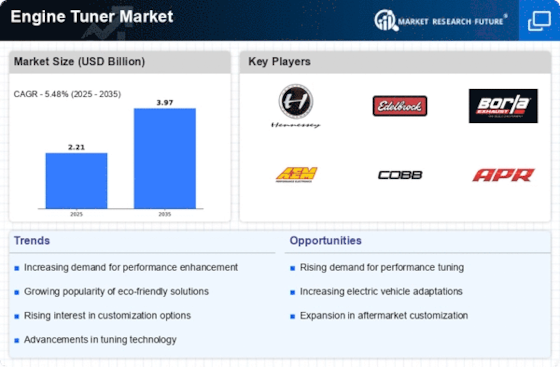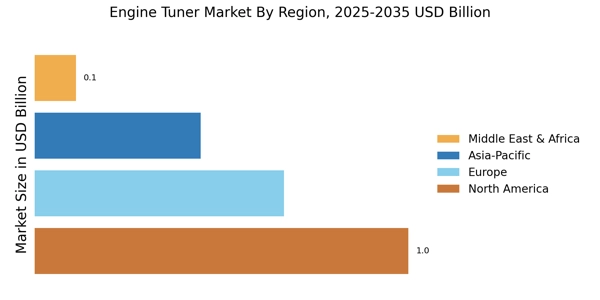Regulatory Changes and Emission Standards
Regulatory changes and stringent emission standards are reshaping the Engine Tuner Market. As governments worldwide implement more rigorous environmental regulations, consumers are increasingly seeking tuning solutions that enhance fuel efficiency while reducing emissions. This shift presents both challenges and opportunities for manufacturers. Data indicates that the market for eco-friendly tuning solutions has grown by 30% in response to these regulations. Companies are now focusing on developing products that not only improve performance but also comply with environmental standards. This dual focus on performance and sustainability is likely to drive innovation within the Engine Tuner Market, as manufacturers strive to meet the evolving demands of consumers and regulators alike.
Growing Interest in Motorsports and Racing
The Engine Tuner Market is significantly influenced by the growing interest in motorsports and racing activities. As more individuals participate in or attend motorsport events, the demand for performance tuning solutions escalates. This trend is evident in the increasing number of amateur racing leagues and track days, which encourage enthusiasts to modify their vehicles for competitive performance. Market analysis indicates that the motorsports segment has contributed to a 25% increase in engine tuner sales over the past year. This heightened interest not only boosts sales but also fosters a community of tuners who share knowledge and experiences, further propelling the Engine Tuner Market forward. Manufacturers are responding by developing specialized products tailored for racing applications, thereby expanding their market reach.
Rising Demand for Performance Enhancements
The Engine Tuner Market experiences a notable surge in demand for performance enhancements among automotive enthusiasts. As consumers increasingly seek to optimize their vehicles for better speed, fuel efficiency, and overall performance, the market for engine tuners expands. Recent data indicates that the performance tuning segment has grown by approximately 15% annually, reflecting a shift in consumer preferences towards personalized driving experiences. This trend is further fueled by the proliferation of aftermarket parts and tuning software, which allow users to modify their vehicles easily. Consequently, manufacturers in the Engine Tuner Market are innovating to meet these demands, offering advanced tuning solutions that cater to a diverse range of vehicles, from sports cars to everyday sedans.
Expansion of E-commerce and Online Retailing
The expansion of e-commerce and online retailing has transformed the Engine Tuner Market, providing consumers with unprecedented access to a wide range of tuning products. As online shopping becomes increasingly popular, consumers are more inclined to purchase engine tuners and related accessories through digital platforms. Recent statistics reveal that online sales in the automotive aftermarket have surged by 40%, indicating a shift in consumer purchasing behavior. This trend has prompted manufacturers to enhance their online presence and invest in digital marketing strategies to reach a broader audience. Consequently, the Engine Tuner Market is likely to benefit from this shift, as e-commerce platforms facilitate easier access to tuning solutions, thereby driving sales and fostering consumer engagement.
Technological Advancements in Tuning Solutions
Technological advancements play a pivotal role in shaping the Engine Tuner Market. The integration of sophisticated software and hardware solutions has revolutionized the tuning process, making it more accessible and efficient for consumers. Innovations such as real-time data monitoring and cloud-based tuning platforms have emerged, allowing users to customize their engine settings with unprecedented precision. Market data suggests that the adoption of these technologies has led to a 20% increase in user engagement with tuning products. As a result, companies are investing heavily in research and development to create cutting-edge tuning solutions that not only enhance performance but also ensure compliance with regulatory standards. This focus on technology is likely to drive further growth in the Engine Tuner Market.

















